Are food foragers unfairly maligned?
- Published
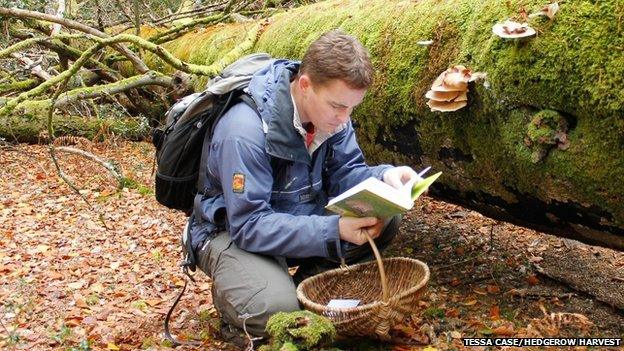
It is important to know what you are taking and only pick things you will eat
In the past few years there has been a "wild food" boom with celebrity chefs heading for the great outdoors in search of fresh ingredients. So, how practical is it to live solely on wild food? And does spurning the supermarket, as some critics have claimed, make you just a bit annoying?
The five-second rule does not apply in the forest. The fruit, leaves and fungi on or near the ground are ripe for the taking and more of us are taking advantage.
But is it possible to live purely on food found in nature's supermarket?
Fergus Drennan has been eating only foraged food for a month. He has scoured the Kent countryside for hawthorn berries, nettles, seaweed, chestnuts, walnuts, sea buckthorn berries and rosehips - and eaten them in a variety of smoothies, soups and porridges.
He has also found a source of protein each day. Some days this might be oysters from Herne Bay but, on other occasions, he tucks into what he terms "accidental meat" - or as you and I know it - roadkill.
"I want to see how eating like this can fit in with modern life and a busy lifestyle," he says.
"I think it can, but it takes a bit of preparation, but compare that with the time you would spend cooking anyway and it is much less."
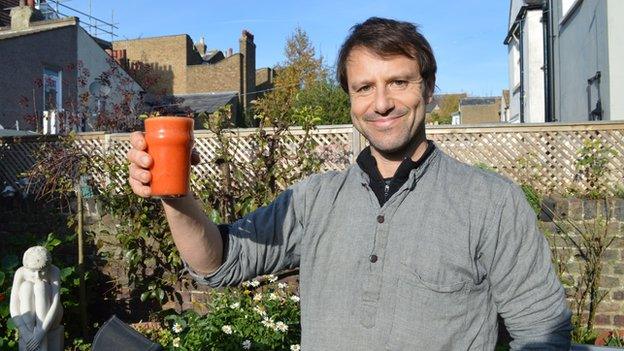
Fergus Drennan, who has been living off wild food for a month, enjoys a rosehip smoothie for lunch
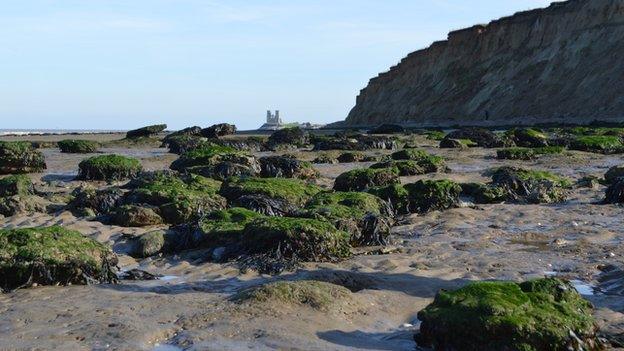
The views while foraging beat those of supermarket aisles and busy tills
After 29 days he says he has lost a bit of weight and is still awaiting the results of medical tests examining his new diet's impact on his health. He says he was motivated to explore whether it was possible to interact with nature without exploiting it.
"As soon as you are turning the natural world in to pounds and pence it is a completely different relationship."
While Mr Drennan's experiment might be extreme, his example is being imitated by growing numbers of foodies who are signing up for foraging courses.

Mushroom foraging code of conduct
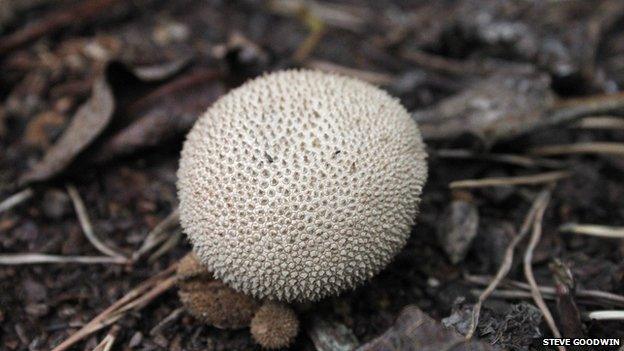
Always seek the landowner's or site manager's permission before you enter land and explain the purpose of your visit
Follow the Countryside Code, external
Try to minimise damage to vegetation, leaf litter, soil and other features
Avoid removing dead wood unless this is necessary to identify a fungus
Take a reputable field guide with you and try to identify as many fungi as you can in situ
Ancient woodlands usually contain a rich variety of different types of fungi and may include some rare species. Particular care should be taken when collecting from these sites
Source: British Mycological Society, Forestry Commission, Natural England, The National Trust, The Woodland Trust and Association of British Fungus Groups

John Wright, who works with the River Cottage chef Hugh Fearnley-Whittingstall, takes people out on foraging courses in and around Dorset.
He says foraging is environmentally safe as most of the foraged foods - like blackberries and stinging nettles - are so common, taking some will not deplete the stocks.
"It has become enormously more popular," he says. "It is allowing people to feel an instinct they didn't know they had.
"Even going to the supermarket is an ersatz foraging experience. The more people know about the natural world the more people will love it."
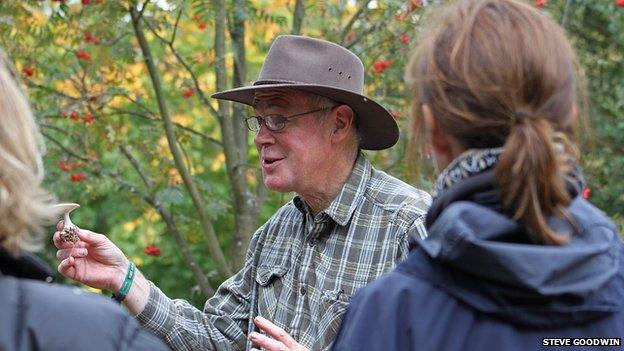
John Wright runs courses for foraging, which he says attract people of all ages and backgrounds
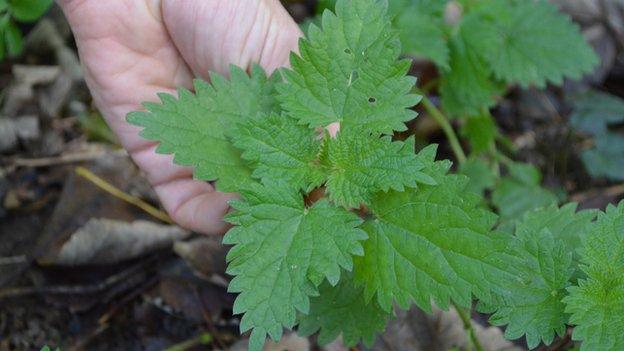
Foragers soon master how to pick nettles without getting stung
But not everyone is enamoured. Food writer Jay Rayner has railed against the trend, criticising "pasty-faced young men and women, wearing jumpers over their chefs' whites, stumbling about looking for produce".
"It won't improve your food," he writes in the Guardian. "But it's guaranteed to make you bloody annoying.", external
So is he right? Miles Irving, who wrote the Forager Handbook and runs a company selling wild food to restaurants, disagrees.
"I can certainly vouch for the fact that organic food is better for you and most wild plants are off the Richter scale in terms of taste and nutrition," he says.
"It is not a gimmick, it is not superficial. It is appealing and interesting to a lot of people. The food is better for you, it tastes better, no one has had to put chemicals in the ground to make it and it has value as part of an eco-system."
"Some people do it more for the sake of it being trendy rather than understanding what benefit it has," says Iain Pennington, who is co-head chef of the Ethicurean restaurant in Wrington, near Bristol.
"But that's no bad thing as they are sourcing it from around them anyway. It all works in favour of sustainability.
"Jay Rayner is missing the point. People are really passionate and concerned about the environment. A lot of the mushrooms other people have will be imported from France, and that's not sustainable when it's on your doorstep. Why go to France?"
But while the fruits of the forest may appear to be there for the picking, is it legal to forage? Mr Wright said the law in this area was still "untested".
This year there have been claims gangs have "raided the New Forest", external and stripped away edible fungi to sell on.
In the New Forest, commercial picking is banned while individual pickers are urged to follow the Fungi Collectors' Code, external, which encourages people not to take all the mushrooms in one area.
Critics say large-scale foraging can damage the woodland and deprive animals of a food source. However, James Feaver, whose Hedgerow Harvest company offers foraging courses in the South, said: "There has never been a scientific paper that says picking mushrooms affects the next year's haul."
According to the Forestry Commission, no prosecutions have yet been brought in the New Forest for commercial picking. However, it seems safest to take a common sense approach.
"Anecdotal information suggests that commercial picking is thought to be on the increase, and the aftermath/evidence of teams of pickers can often be seen," says the Commission's Bruce Rothnie.
"We give a copy of the Fungi Collecting Code of Conduct to those pickers we see on the public forest estate and will confiscate excessive amounts of picked fungi as a legitimate enforcement of the code."
- Published21 October 2010